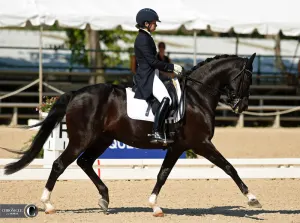Chase Hickok wasn’t anticipating anything unusual as she drove to the U.S. Department of Agriculture quarantine center at the Miami International Airport on Aug. 8 to pick up Sagacious HF after a successful European CDI tour.
But when she got a phone call from the flight broker telling her the 18-year-old Dutch Warmblood gelding (Welt Hit II—Judith, Cocktail) had tested positive for the highly contagious disease glanders, a routine pick-up turned into something much more stressful.
Sagacious, owned by Hyperion Farm, has traveled the world with Hickok, 27, as well as his former riders Caroline Roffman and Lauren Sammis. Hickok had just returned from a trip representing the United States on Nations Cup teams at Hickstead (England) and Falsterbo (Sweden).

Sagacious HF and Chase Hickok recently returned from a successful European CDI tour, but the horse is still in quarantine due to a positive test for glanders. Photo by Kimberly Loushin.
When horses return to the United States from other countries they must undergo a quarantine period and be tested for glanders and the contagious diseases dourine, equine piroplasmosis and equine infectious anemia.
Glanders, which has been eradicated from the United States, can be detected using two types of test, the complement fixation test, or CFT, and the Western blot test.
The CFT test is the standard test at USDA quarantine facilities, and Sagacious tested positive twice, but he showed no signs of infection. The symptoms usually include a high fever and a thick nasal discharge.
ADVERTISEMENT
Glanders is also contagious to humans.
“I flew with him on the plane and had another horse on the plane as well that was in the same box as he was for the entire duration of the flight,” said Hickok. “That horse, from Day 1, has tested negative. I was told from the beginning that if he really had glanders, and I was exposed to it, I would probably be sick.”
After the second test came back positive, Hickok and owner Al Guden started looking at other options when they were told they would have to send the gelding back to Europe or euthanize him.
“As we were starting to fact find, our friend in California, Christine Traurig, sent an article about a race horse in a similar situation. Her owners had moved heaven and earth to get her released and enlisted the help of an attorney,” said Hickok. “Immediately I got on the phone and started calling these race horse owners and left messages and sent emails, not really expecting them to get back to me, but thinking, ‘What the heck? It can’t hurt at this point.’ Sure enough, 30 minutes later I got an email from this attorney, Chapman Hopkins.”
Hopkins had worked on the 2016 California case where a Thoroughbred mare named Tooreen Dancer had come back with a false positive CFT test.
Hopkins advised Hickok and Guden not to ship Sagacious out of the country.
ADVERTISEMENT
“We decided to see if we could work together with the USDA and come up with a better plan considering there was some precedent to have false positives and eventually come up negative, which was the case of that race horse,” she said.
Within 24 hours of speaking with Hopkins, the USDA allowed Sagacious to be tested using the Western blot test, which is more commonly used in Europe. That test, conducted on Aug. 11, came back negative, but now the gelding must stay in quarantine and be retested using both tests on Aug. 23.
“That was a huge sigh of relief for us,” said Hickok. “The USDA has been nothing but understanding of our situation and said, ‘This CFT test we’re using is maybe not the most reliable or accurate. Let’s see what we can do and figure out a way to make this work for everybody.’ ”
Hickok hasn’t been able to see the gelding and was told he’s being cared for by people in hazmat suits, but she’s feeling optimistic his final tests will be negative.
“Now that we’re sort of on the other side and feel like we can take a little bit of a deep breath, we’re anxious to get him home and have this all behind us,” she said. “We’re excited to hopefully be able to shine some light and help other people who might have gone, will be going, or could avoid this similar situation, and see what we can do about getting some more reliable testing. If nothing else, some good can come from this: a happy ending for us and hopefully help somebody else out there, and try to streamline this procedure and make it not quite so traumatic!”
Save














